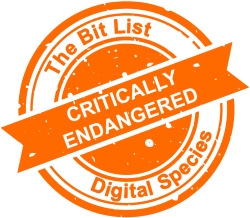Digital Archives from Public Enquiries and Commissions
 |
||
|
Data from public enquiries and reconciliation commissions which can be traumatic, politically uncomfortable and contested, typically comes in many different forms and formats. Data protection issues and cultural sensitivities only amplify the challenge to preservations. |
||
|
Digital Species: Political Data, Legal Data |
Trend in 2022:
|
Consensus Decision |
|
Added to List: 2017 |
Trend in 2023:
|
Previously: Critically Endangered |
|
Imminence of Action Action is recommended within twelve months, detailed assessment is a priority. |
Significance of Loss The loss of tools, data or services within this group would impact on people and sectors around the world. |
Effort to Preserve | Inevitability Loss seems likely: by the time tools or techniques have been developed the material will likely have been lost. |
|
Examples The Tunisian Truth and Dignity Commission to investigate human rights violations committed prior to 2012; enquiries into historical child abuse; Bloody Sunday Enquiry (Saville Inquiry); East Timor Tribunal. |
||
|
‘Practically Extinct’ in the Presence of Aggravating Conditions Risk of falsification; fragile or obsolete media; dependence on proprietary formats or products; lack or loss of documentation; inaccessible to web harvesting technologies; lack of version control; lack of integrity checks or integrity records; poor chain of custody; inability to identify an archival authority; loss of personal testimonies. |
||
|
‘Endangered’ in the Presence of Good Practice Strong sense of archival responsibility; carefully constructed rules around information privacy that retain robust and appropriate preservation capabilities; clear legislation on retention and permanency, an appraisal of perceived value with resources to undertake preservation actions. |
||
|
2023 Review In 2019, this entry became a subset of an entry introduced in 2017 for ‘Digital Legal Records and Evidence,’ which was split into four more discrete entries. This category includes evidence from public enquiries and commissions that have been presented in court. It recognizes that courts are not limited in the types of evidence that they can admit but that they have a responsibility to provide robust preservation that ensures the authenticity of their records and evidence. The 2021 Jury noted that there is considerable evidence of good practice emerging from some of the examples where clear archival responsibility has been the key to progress but not to the extent of changing the risk profile or 2021 trend for the entry. The 2023 Council agreed with the Critically Endangered classification with overall risks remaining on the same basis as before (no change to the trend), while also noting that personal testimonies are particularly vulnerable, thus highlighting the importance of independent archives and advocacy for preserving these records. |
||
|
Additional Comments National or state recordkeeping regimes and legislation are often clear on the retention or permanency of these types of records. A major issue, however, is embargoes. When an embargo is lifted, will the file format or database continue to work, or will it longer work, making the data useless? Case files and correspondence are one thing. Retention of these should be clear but may differ widely between jurisdictions and levels of government. If retention is not long-term or permanent, the risk of loss may not be so critical. Retention of 'unused' or 'potential' evidence is likely a different matter altogether. It may not even be considered a record, and certainly is not a record of the court. Should it be returned to the suspect or accused? Are their rights being considered here - not just in terms of preservation, but also simply disposition? There are legal and ethical issues around this that need to be fleshed out in conjunction with assessing its preservation risk. Personal testimonies provided to commissions of inquiry but are not used as part of its legal investigations are in a particularly vulnerable state. The recent Mother and Baby Homes commission in Ireland collected a number of personal testimonies from survivors, but these were not used to inform the commission's final report as they were not presented to the commission's legal hearing iteration. After the commission's report, it announced that it intended to destroy these testimonies, and refused to allow survivors to access transcripts or recordings of their own testimony. A public outcry halted this planned destruction, but access to their testimonies is still difficult for survivors. Independent archives can provide a crucial role in cases such as these; whether state commissions would be willing to work with independent bodies in these cases remains to be seen. Case Studies or Examples:
|
||






























































































































